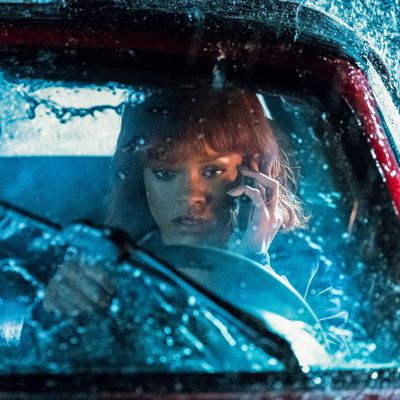
On Monday’s episode of Bates Motel, A&E’s reimagined story of Norman Bates will introduce its latest iconic character borrowed from Alfred Hitchcock’s Psycho: Marion Crane. When Hitchcock originally cast Janet Leigh for the role, he intended to shock audiences by killing off a famous Hollywood star. Times have changed, but Bates Motel co-creators Kerry Ehrin and Carlton Cuse certainly took a similar lesson to heart: In their version, Marion Crane is played by Rihanna. Vulture spoke with Ehrin and Cuse about how they cast the international superstar, what she’s like on set, and what’s ahead as Bates Motel approaches its series finale.
We’re here to talk about Carlton Cuse’s guest acting turn in episode five, right? The big superstar cameo of the season?
Carlton Cuse: I better hang up now. [Laughs.]
Seriously, how did that happen?
Kerry Ehrin: You know, we were in the writers room, breaking the story, and the scene with the cop came up. I just was thinking of that cop’s face from the movie and how intimidating he is when he looks in the window. I just thought, “Oh my God! That is the cameo for Carlton!” We pitched it to him, and he was a little reluctant. We talked him into it. It had to happen.
I’m looking forward to the spinoff. Let’s get to the big question: How did Rihanna wind up on Bates Motel? When Hitchcock cast Janet Leigh as Marion Crane, he very purposefully chose a well-known star, someone whose demise would shock audiences. Was it always your intention to do the same?
CC: I think it’s always hard to have that level of hubris when you’re making a beloved but relatively small cable show. What we wanted to do was cast someone who wouldn’t be a pale imitation of Janet Leigh. And what happened was I was just reading Vanity Fair and I was reading a profile of Rihanna, and, in there, she said Bates Motel was her favorite show. I was like, “What?!” Kerry and I had been talking a lot about how we were gonna solve this Marion Crane problem, and I called her up and was like, “Hey, did you know Rihanna loves our show? What do you think of Rihanna for Marion Crane?” Kerry loved the idea, so I made some calls. I was really expecting that the answer would be absolutely not, but it turns out she really was a big fan of the show. When the idea was proposed to her, she was very excited about it. She stepped out of her concert tour to come to Vancouver and shoot.
Was she also a fan of Hitchcock or just the show?
KE: She clearly knew the movie, yeah.
CC: Kerry and I got on the phone with her and pitched the character. We made it very clear we wanted to take this character in a different direction. Fundamentally, it was not going to be possible to make Marion Crane an empowered woman of 2017 if she just died in the shower. Rihanna really embraced our idea of redefining the character. That was the moment in which she said I’m all-in.
Would it have mattered if she hadn’t seen Psycho?
KE: No. I don’t think so.
How much do you encourage your cast to be familiar with the movie? Does Austin Nichols, for example, work off of the original iteration of Sam Loomis?
KE: We didn’t discuss it with him. Psycho is such a classic film that everyone has seen it. I’ve never run into anyone that didn’t see it. That goes without saying. It’s in the back of people’s heads to begin with.
CC: We try to make the process about making our show, and not about making our show in the context of being reverential to the original movie. Our process with the actors is really, “We’ve come up with these characters, and, yes, they’re derived from this other movie.” But all of our focus and preparation is about our version of the characters.
How was Rihanna different from other actors? What did she bring to the role that others wouldn’t have?
KE: Everyone is so specifically unique. She is miraculously charismatic. There’s tons of pathos in her. At the same time, there’s a youthful innocence, combined with a worldliness that is incredibly interesting. And there’s also a savviness that seemed really appropriate for reframing this character.
What was she like on set?
KE: Completely lovable.
CC: We were trying to shoot an amazing amount of work to fully develop the character, and it takes a lot of time to film that. People were like, “You should temper your expectations. You should cut the amount of pages she has to shoot.” We didn’t. She showed up and she worked her ass off. She was fully committed. Even before she would come on set, she had to go through a couple of hours of makeup to cover her tattoos. She worked incredibly long days. The charisma was something I knew about and expected because that’s just evident about her. The thing that really impressed me was her work ethic. She had to work incredibly hard in a short amount of time so she could get back to her tour.
How long have you known what to do with Marion Crane? Did you know how you’d redefine her from the beginning?
KE: It’s been instinct to want to pull Marion Crane into 2017 and see what that character looks like. The character of a woman who’s in love with a guy and he’s not committing is … I’m sure Aristophanes wrote a play about that. [Laughs.] It’s been around a long time. There are different versions of it through history. We wanted to tell that story more from the inside of that experience for her. That was the instinct. And, at the same time, putting it in the world of Bates Motel and honoring Psycho.
How long ago did you decide how the series would end?
CC: We knew what we wanted to do from the very beginning. When Kerry and I were talking about it, we envisioned a five-year plan. We talked about the last year being our version of Norman from the movie. Mother was dead and he’s around her body and in his full-blown psychosis. Our imagining of the ending was something we talked about early on. The specifics of how it played out got worked out this year, but the emotional intention was something that we knew very early. We were lucky. It’s amazing. A lot of shows fail, or things come up. The amount of time gets shortened. The fact that we got to execute our five-year plan as we imagined it in our heads was an incredible thing.
How much will you miss it? Do you miss it already?
KE: Oh, yeah. It’s very much a family. It’s such a unique show — tonally, and getting to work with these amazing actors, and getting to do horror and character writing and dark comedy. It’s been such a tremendously fun playground. Absolutely, I’ll miss it. But we’re also really really proud of it. And also exhausted. [Laughs.] Emotionally drained.
I’m sure. Especially Freddie Highmore — he’s just amazing.
CC: The biggest frustration for me with the show is that Freddie hasn’t been recognized — even nominated, let alone win. It’s hard to say that anybody is doing better work on television right now, particularly this season.
This interview has been edited and condensed.


